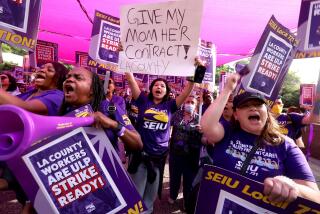AFL-CIO Backs Transit Unions’ Demands
- Share via
The county Federation of Labor, which represents 800,000 workers, on Monday backed the demands of three Metropolitan Transportation Authority unions for a new contract and threw its support behind a transit strike Friday morning if no agreement with bus and train operators, mechanics and clerks is reached.
The AFL-CIO’s sanction for a strike heightens pressure on the MTA to come to terms on a new three-year contract or face the prospect of a walkout that would shut down rail service and severely cripple MTA bus service across Los Angeles County.
Miguel Contreras, executive secretary-treasurer of the labor federation, said organized labor is prepared “to shut down the MTA because we are being forced to shut down the MTA. We’re being forced out on strike by the board of directors of the MTA. This is not a strike of our choosing,” he said. “We’re being forced out because they want to get a cheaper standard of living on the backs of our members. The unions of L.A. County will not allow that to happen.”
The AFL-CIO’s action means other unions, including the Teamsters, will be asked to respect the picket lines of MTA workers if they strike. That could spell immediate trouble for the MTA’s plans to use private firms whose drivers are affiliated with the Teamsters to operate up to 100 buses on five bus lines in the event of a walkout. The MTA normally runs 2,000 buses a day on 200 routes.
Contreras, surrounded by the leaders of the three MTA unions, apologized in advance for inconvenience to mass transit users, most of whom are poor and members of minority groups.
The MTA’s chief operating officer, Allan Lipsky, said the MTA wants to sit down with the three unions beginning this morning and negotiate continuously until an agreement is reached. “There is no reason we can’t make a deal,” Lipsky said. “Everything is on the table, everything is negotiable.”
But patience is wearing thin. James Williams, general chairman of the United Transportation Union, which represents MTA bus and rail operators, told reporters that he was not optimistic about reaching a pact before the deadline he set at 12:01 a.m. Friday. “We are not close. We are not even somewhat close,” he said.
Williams said a major impediment to an agreement is the MTA’s insistence on instituting a four-day, 10-hour-a-day workweek for a number of its drivers. “I absolutely cannot live with that,” he said.
The MTA has wanted changes in work rules, including the four-day workweek, to reduce overtime and cut operating costs, which are higher than other Los Angeles-area transit districts.
Williams said the union believes the proposed workday is so long that it raises issues of safety and fatigue. The MTA rejects such suggestions. The two sides have dug in about their position on a shorter workweek.
While the drivers’ union struggles over the workweek and other issues, the Amalgamated Transit Union, which represents mechanics and maintenance workers, continues to be at odds with the MTA over creation of new transit zones in the San Fernando and west San Gabriel valleys.
Neil Silver, president of the mechanics union, distributed a letter from the MTA’s chief negotiator, Tom Webb, to Steve C. DeBaun, attorney for the proposed San Fernando Valley transit district. The Aug. 28 letter discusses in general terms issues involved in the negotiations with the MTA’s unions.
“The zone issue is the single greatest strike threat in negotiations with at least two if not three unions,” the MTA negotiator wrote. “We are strategically balancing the ability to create a zone by offering limited conditions for the unions to waive their contract language precluding a zone.”
The mechanics union leader fears that unless pending legislation on Gov. Gray Davis’ desk is signed into law, a Valley transit zone could be created without adequate protections for his members’ wages, benefits and jobs.
Angered by the letter, Silver accused the MTA of bargaining in bad faith and crippling negotiations by communicating with a third party--the attorney for the zone.
Webb noted in the letter that the San Fernando Valley Transit Zone board does not have standing in negotiations with the MTA’s unions. “We are walking a very fine line,” Webb wrote. “At some point the unions could legitimately and legally create embarrassment for the MTA. In order to protect my client against charges of surface bargaining and to protect them from unfair labor practice charges, I informed the unions through their counsel that we have been communicating.”
Silver said there was no such notice to the union’s attorneys.
Lipsky responded later by defending the letter. “We haven’t been discussing the negotiations with the zone,” he said. “We have been in communication to try to get some clear understanding of what their objectives and requirements are.”
The MTA executive said the zone issue should not be an obstacle to a new contract because the MTA is willing to agree to protections for any union employees transferred to a transit zone should one be created.
More to Read
Sign up for Essential California
The most important California stories and recommendations in your inbox every morning.
You may occasionally receive promotional content from the Los Angeles Times.













